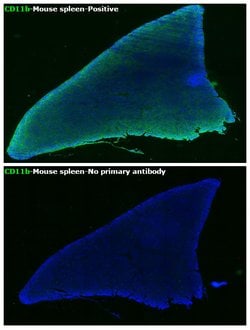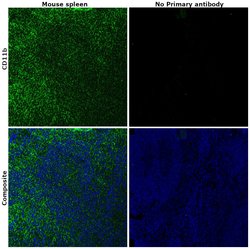Läs mer
Invitrogen™ CD11b Monoclonal Antibody (M1/70), eBioscience™, Invitrogen™


Rat Monoclonal Antibody
706.00 SEK - 3905.00 SEK
Specifikationer
| Antigen | CD11b |
|---|---|
| Klona | M1/70 |
| Koncentration | 0.5 mg/mL |
| Användningsområden | Flow Cytometry, Functional Assay, Immunohistochemistry (Paraffin), Immunoprecipitation, Neutralization |
| Klassificering | Monoclonal |
| Produktkod | Brand | Kvantitet | Pris | Kvantitet och tillgänglighet | |||||
|---|---|---|---|---|---|---|---|---|---|
| Produktkod | Brand | Kvantitet | Pris | Kvantitet och tillgänglighet | |||||
|
15266797
|
Invitrogen™
14-0112-81 |
50 μg |
706.00 SEK
50µg |
Vänligen Logga in för att beställa denna produkten. Behöver du ett Webbkonto? Registrera ditt konto idag! | |||||
15276797
 |
Invitrogen™
14-0112-82 |
100 μg |
1222.00 SEK
100µg |
Vänligen Logga in för att beställa denna produkten. Behöver du ett Webbkonto? Registrera ditt konto idag! | |||||
|
15286797
|
Invitrogen™
14-0112-85 |
500 μg |
2085.00 SEK
500µg |
Vänligen Logga in för att beställa denna produkten. Behöver du ett Webbkonto? Registrera ditt konto idag! | |||||
|
15296797
|
Invitrogen™
14-0112-86 |
1 mg |
3905.00 SEK
1mg |
Vänligen Logga in för att beställa denna produkten. Behöver du ett Webbkonto? Registrera ditt konto idag! | |||||
Beskrivning
Description: The M1/70 monoclonal antibody reacts with mouse CD11b, the 165-170 kDa integrin alphaM. CD11b non-covalently associates with CD18 to form alphaMbeta2 integrin (Mac-1) and binds to CD54 (ICAM-1), C3bi, and fibrinogen. Mac-1 is expressed by macrophages, NK cells, granulocytes, activated lymphocytes and mouse B-1 cells in the peritoneal cavity. M1/70 is also cross-reactive to human CD11b, and can be used for the detection of this antigen on human peripheral blood monocytes, granulocytes, and a subset of NK cells. Through interactions with its ligands, CD11b participates in adhesive cell interactions. Applications Reported: The M1/70 antibody has been reported for use in flow cytometric analysis, immunoprecipitation, and immunohistochemical staining of frozen tissue. The M1/70 clone is not recommended for immunohistochemical staining of formalin-fixed paraffin embedded tissue. M1/70 has also been reported in in vitro blocking of CD11b function. (Please use Functional Grade purified M1/70, cat. 16-0112, in functional assays.). Applications Tested: The M1/70 antibody has been tested by flow cytometric analysis of mouse splenocytes. This can be used at less than or equal to 0.25 μg per test. A test is defined as the amount (μg) of antibody that will stain a cell sample in a final volume of 100 μL. Cell number should be determined empirically but can range from 10^5 to 10^8 cells/test.
CD11b (integrin alpha-M, ITGAM, integrin alpha-X, ITGAX) is a 165 kDa adhesion molecule that associates non-covalently with integrin beta-2 (CD18). The CD11b/CD18 heterodimeric complex is also known as integrin alpha-M beta-2, Mac-1, and CR3 (complement receptor 3). CD11b is expressed on the surface of monocytes/macrophages, granulocytes, activated lymphocytes, a subset of NK cells, a subset of dendritic cells, and microglia in the brain. CD11b/CD18 functions as the receptor for ICAM-1 (CD54), ICAM-2 (CD102), ICAM-4 (CD242), CD14, CD50, CD23, heparin, iC3b, fibrinogen, and Factor X -these adhesions are critical for cell-cell and cell-matrix interactions. CD11b is expressed on 8% of spleen cells, 44% of bone marrow cells, and less than 1% of thymocytes, and is commonly used as a microglial marker in nervous tissue. The expression of CD11b increases during monocyte maturation and expression levels vary on tissue macrophages. Further, peritoneal macrophages are reported to express higher levels of CD11b than splenic macrophages. Diseases associated with CD11b dysfunction include systemic lupus erythematosus 6 and ITGAM-related susceptibility to systemic lupus erythematosus.Specifikationer
| CD11b | |
| 0.5 mg/mL | |
| Monoclonal | |
| Liquid | |
| RUO | |
| PBS with 0.09% sodium azide; pH 7.2 | |
| antigen CD11b (p170); antigen CD11b (p170); macrophage antigen alpha polypeptide; CD11 antigen-like family member B; CD11b; CD11B (p170); CD11b/CD18; cell surface glycoprotein MAC-1 alpha subunit; cell surface glycoprotein MAC-1 subunit alpha; complement component 3 receptor 3 subunit; complement component receptor 3 alpha-a; complement receptor type 3; CR3; CR-3 alpha chain; CR3A; F730045J24Rik; integrin alpha M; integrin alpha-M; integrin subunit alpha M; integrin, alpha M; integrin, alpha M (complement component 3 receptor 3 subunit); ITGAM; Leukocyte adhesion receptor MO1; leukocyte integrin alpha-M chain; LOC100351865; Ly-40; MAC1; Mac-1; Mac-1 alpha; Mac-1 alpha (Mac1A); MAC-1 alpha subunit; MAC1A; Mac-1a; macrophage antigen alpha; macrophage antigen alpha polypeptide; MGC117044; MO1A; Neutrophil adherence receptor; neutrophil adherence receptor alpha-M subunit; SLEB6; unnamed protein product | |
| ITGAM | |
| Primary | |
| 4°C | |
| ITGAM |
| M1/70 | |
| Flow Cytometry, Functional Assay, Immunohistochemistry (Paraffin), Immunoprecipitation, Neutralization | |
| Unconjugated | |
| Rat | |
| Mouse | |
| P05555 | |
| 16409 | |
| IgG2b κ | |
| Affinity chromatography | |
| Antibody |
For Research Use Only.
Din input är viktig för oss. Fyll i det här formuläret för att ge feedback relaterad till innehållet på denna produkt.


